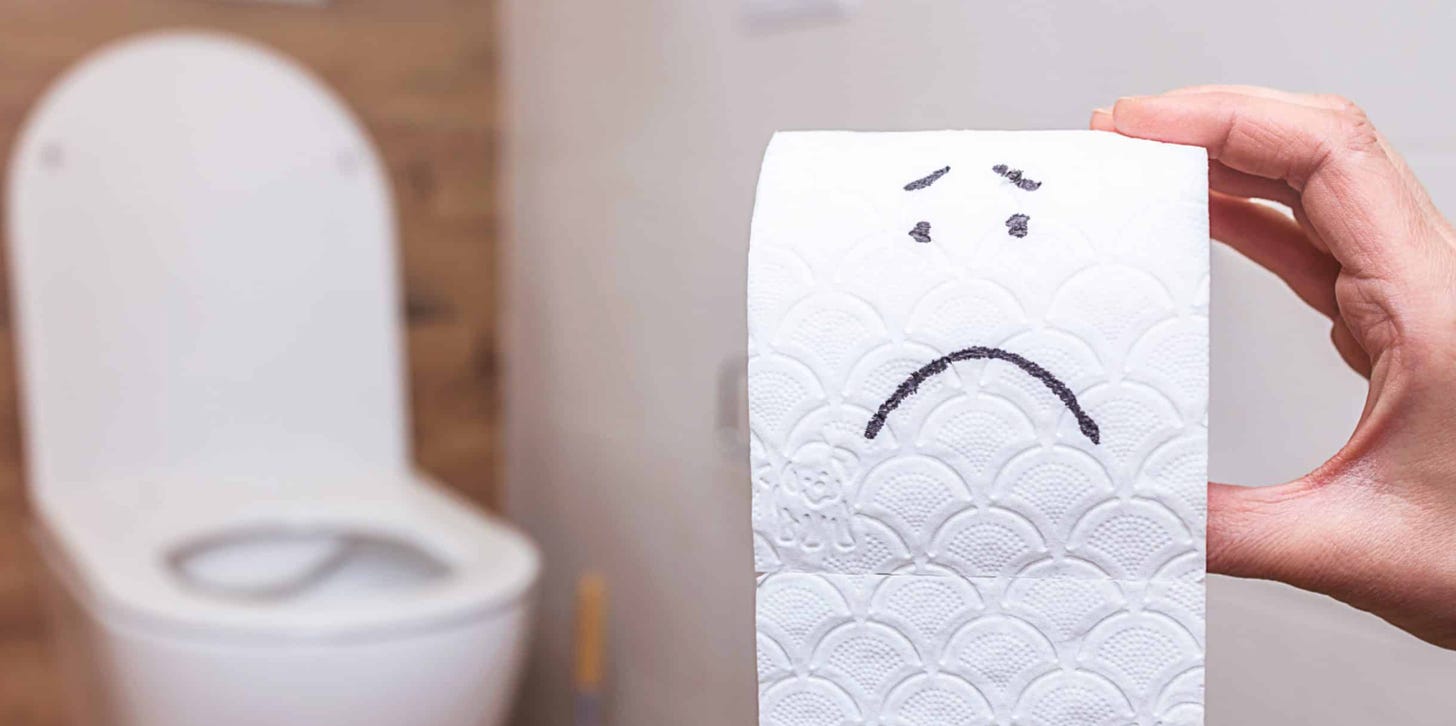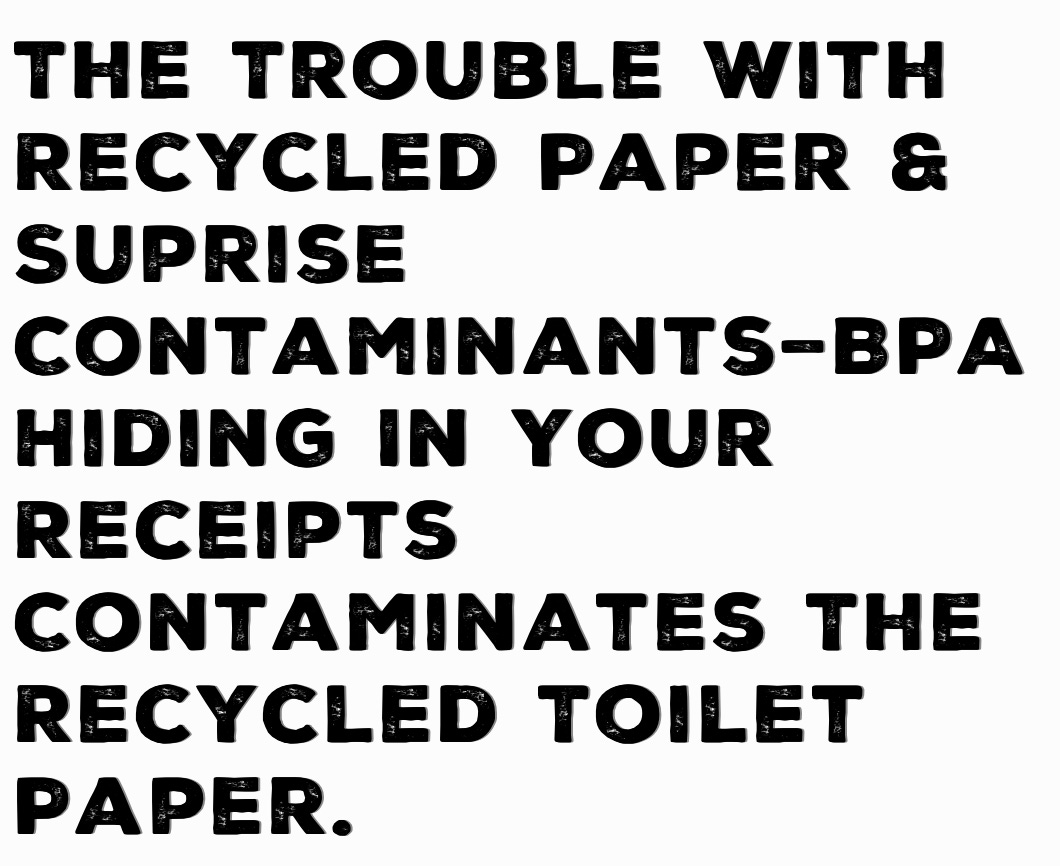Wipe Out: The Alarming Truth About Your Toilet Paper
Getting to the bottom of the dangers of toilet paper.
Yes, I’m taking a break from national and global events to talk about something that everyone uses—unless, perhaps, you live in the Middle East and have become accustomed to using your left hand: toilet paper
Who knew that wiping your behind could lead to such a crappy situation? For the last couple of years, I'd been battling an increasingly irritated nose, complete with bloody noses and dryness that would make the Sahara jealous. Because of this I had turned to facial tissues and toilet paper to soothe my troubled schnoz: blowing my nose throughout the day, and stopping any light bleeding.
It had turned into a conundrum for me.
My partner and I, feeling particularly eco-conscious, had switched to a sustainable TP brand called Who Gives a Crap a few years back. We thought, "Hey, if it's good for the planet, it must be good for our bums, right?"
Oh, how wrong we were.
My partner had stumbled onto an article about hidden chemicals in TP including sustainable products.
It turns out our environmentally friendly TP was harboring a dirty little secret – a high amount of those infamous Forever Chemicals. You know, the ones from that cheery film "Dark Waters"? Yeah, THOSE chemicals. Suddenly, our attempt at saving the planet was looking more like a direct assault on our own bodies.
Who knew that reaching for a roll could be like playing Russian roulette with your rear end… and nose?
Horrified by the thought of depositing these chemicals dangerously close to my brain on a daily basis, I did what any sensible person would do – I channeled my inner grandparent and ordered some organic bamboo and cotton handkerchiefs from Etsy. Lo and behold, within just three days of using these old-school nose-wipers, my troubled nose cleared up faster than a politician's memory during a scandal.
THE GREAT TOILET PAPER CONSPIRACY
While choosing recycled toilet paper may feel like a heroic act for the planet, it never dawned on me they would be harboring bisphenols like BPA and BPS. These pesky chemicals often hitch a ride from thermal receipt paper, which is contaminated with bisphenols, into our recycled paper products. So, while you're saving trees, you might also be unwittingly introducing endocrine disruptors into your bathroom routine.
The health implications of these bisphenols are no laughing matter. Studies have linked them to reproductive issues, early puberty, low sperm count, and even breast cancer. So, the next time you reach for that eco-friendly roll, remember that your good intentions might come with a side of unwanted chemicals. Perhaps it’s time to rethink our bathroom choices and consider alternatives that keep both our planet and our health in mind!
TOILET PAPER CHEMICALS
Chlorine Bleach-Because nothing says "clean" like a chemical that could strip paint. Bleach often involves the use of chlorine, which can produce dioxins. Dioxins are extremely toxic, with risks including reproductive and developmental problems, damaging the immune system, acting as endocrine disruptors, and can be a carcinogen.
Formaldehyde- Preserving our dignity, one wipe at a time. Formaldehyde exposure poses a variety of health risks, ranging from short-term irritation to serious long-term effectslike eye, nose, and throat irritation, coughing, wheezing, nausea, and headaches. Long-term exposure is linked certain cancers, particularly nasal cancer and myeloid leukemia, as well as permanent alterations in nervous system function, memory issues, and respiratory problems.
Phthalates- Studies have linked phthalate exposure to a range of serious health issues, including reproductive problems, developmental disorders, and endocrine disruption. These chemicals have been associated with reduced fertility, early puberty, and an increased risk of certain cancers, particularly in children and developing fetuses. Phthalates may also contribute to obesity, diabetes, and cardiovascular diseases. Of particular concern is their impact on prenatal development, with higher phthalate levels during pregnancy linked to preterm births, lower birth weights, and potential neurodevelopmental issues in children. Given their ubiquity in everyday products, from food packaging to personal care items, reducing exposure to phthalates remains a significant public health challenge.
Fragrances- For that "fresh meadow" scent with a hint of endocrine disruption.
THE BOTTOM LINE (pun inteneded)
While I'm relieved to have found a solution, I can't help but be horrified by the chemical warfare I'd been waging on my own nostrils and bum. As for toilet paper, we've moved on to a better-scoring brand, Grove Tree Free toilet paper. Because let's face it, in the grand scheme of things, who really gives a crap about toilet paper? Apparently, we all should.
To find out how your toilet paper rates, or to find a new roll to purchase, go HERE.
Next on my list. I’m purchasing a toilet bidet!
Bottoms up, everyone!
If you find these interviews and articles informative, please become a paid subscriber for under 17¢ a day. I don’t believe in paywalls, but this is how I make a living, so any support is appreciated. Either way…. it’s available to you….







All, I do see that Who Gives a Crap is working diligently to remove all the PFAS from their toilet paper in the US, Australia, and the EU. They made an announcement on this in May of 2024 so keep your eyes opened to this. These are the steps they are taking right now:
Well, why don’t you call your products fluorine free publicly?
We could, but we’d rather be as transparent as possible. Below 10 ppm just isn’t good enough for us. We want to absolutely eliminate PFAS from our products. We’re on a mission to be truly – not just technically – fluorine free.
Steps we’re taking to eliminate PFAS:
We’ve taken on industry level investigations on every part of our supply chain and manufacturing process
We rigorously test raw materials, packaging inks, cardboard cores and other materials for PFAS
We’ve redeveloped our wrappers since finding minimal traces of PFAS to eliminate them entirely
We’re looking into different water sources to eliminate any trace PFAS that may be coming from groundwater
Been considering the Family Cloth route for awhile now, just haven't pulled the trigger yet. I've saved pure cotton rags to use. Just stash used ones in a diaper pail then launder in hot water and reuse. Simple. If squeamish, start using the cloths for urine and stick to paper for #2 until it's second nature to use the cloths. No worse than cloth diapers for babies (or seniors.) Great preparedness item to have on hand too!